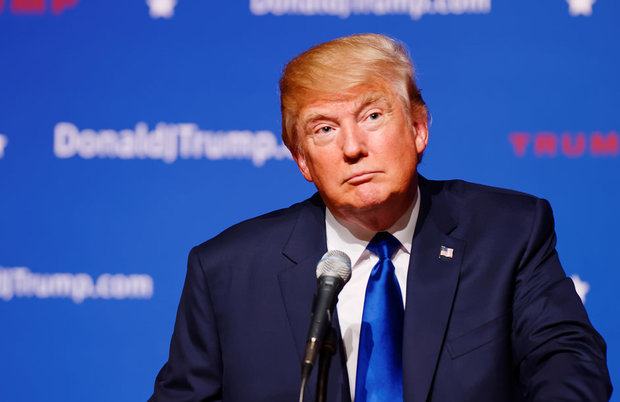ID :
440927
Thu, 03/23/2017 - 00:37
Auther :
Shortlink :
http://m.oananews.org//node/440927
The shortlink copeid
Trump's ISIS challenge

By: Seyed Hossein Mousavian
TEHRAN, Mar. 23 (MNA) – Donald Trump has announced plans to host a 68-nation summit on countering ISIL at the end of March, while Iran and Russia, which form the most effective regional coalition fighting the group, have not been invited.
During his presidential campaign, Donald Trump declared that destroying ISIL would be his top foreign policy priority. He signaled his seriousness about meeting this campaign promise shortly after inauguration day, ordering the Pentagon to develop a plan to more aggressively confront the group. He has since announced plans to host a 68-nation summit on countering ISIL at the end of March. The meeting is aimed to "accelerate international efforts to defeat ISIL."
Notably, however, Iran and Russia, which form the most effective regional coalition fighting the group, have not been invited.
Trump's instincts on the need to seriously address the ISIL threat are correct. Indeed, the UN Security Council has also referred to ISIL as a leading global threat. However, Trump will face five major challenges in any attempt to destroy ISIL, which his own contradictory aims and positions only serve to exacerbate.
Foremost, any strategy to destroy ISIL must be premised not just on confronting a group but an ideology. Trump's first challenge will be to marginalize this ideology. Today, the international community and mainstream Sunni Islamic scholars recognize that all major terrorist groups, whether it be ISIL, al Qaeda or Boko Haram, believe in the stringently puritanical Wahhabi-Salafist offshoot of Sunni Islam. This belief system has its origins in 18th century Arabia and is rooted today in Saudi Arabia, which has spent tens of billions of dollars over the past decades proselytizing it across the globe.
In order for Trump to effectively confront the source of ISIL's ideology, he must raise this issue with traditional US regional allies in a serious manner.
Targeting ISIL's source of funds and weapons will be a second major challenge for the Trump administration. Among the few shared beliefs between Trump and Obama was that US regional allies have been a major source of arms and finances for ISIS and other groups in its ideological vein. Trump himself during the campaign referred to the Saudis as the "biggest funders" of terrorism in the world. Hillary Clinton was of the same belief. Confronting America's allies on this issue will be a highly formidable task.
The fight against ISIL also cannot be won by America alone. Trump's third challenge will be to form a new coalition to defeat and destroy ISIS. To be successful, it will need to be far more cohesive and effective than the one built by Obama. Engaging more with the actors most effectively fighting ISIL on the ground, namely Russia and Iran and their allies, will be critical in this regard. Iran has for its part lost tens of senior commanders on the frontlines against ISIL.
Obama did not achieve any breakthrough victories against ISIL during his presidency. He chose not to pursue substantive cooperation with Russia and Iran and framed their actions negatively. Trump has been vocal in criticizing the Obama administration's policies toward the region, even arguing they gave rise up the group. After just days of being in office, however, Trump imposed new sanctions on Iran and had a phone call with the Saudi king where they discussed strategic cooperation.
This is in fact a copy of Obama's approach. Trump's immigration ban also targets predominately Muslim states whose citizens have not been responsible for the deaths of any US citizens on American soil. Trump has said nothing significant about states that have produced such terrorists, such as Saudi Arabia.
Trump's fourth challenge in confronting ISIS will be to simultaneously achieve his goal of reducing America's military involvement in the region. During his campaign, Trump condemned his two predecessors, Obama and George W. Bush, for launching and mishandling wars in Afghanistan, Iraq, Libya and Syria. After just a few days of being in office, however, he said "all options" were on the table with respect to Iran and approved a raid in Yemen which resulted in the deaths of dozens of civilians, including women and children, and one US service member.
Islamophobia will be Trump's fifth major challenge as he sets to combat ISIL. Destroying ISIL without cooperation from Muslim countries is impossible. The more Trump and his inner circle deride Islam and emphasize terms like "radical Islam," the more they earn the antipathy of Muslims across the globe and their governments.
His ban against travel and immigration from a number of Muslim-majority nations is also driven by the fact that these are Muslim populations. The Muslim world's sentiment towards America has already long been negative, but Trump seems poised to make America even more hated, which is exactly the goal of ISIL.
In order to effectively confront ISIL, Trump will have to alleviate these problems. His diplomatic acumen and legacy will be cemented if he engages the forces fighting ISIL on the ground and brings them into a broad coalition with the existing U.S.-led campaign against ISIL.
Mousavian is a professional specialist at Princeton's Woodrow Wilson School and a former spokesman for Iran's nuclear negotiators. His latest book is "Iran and the United States: An Insider's view on the Failed Past and the Road to Peace."





